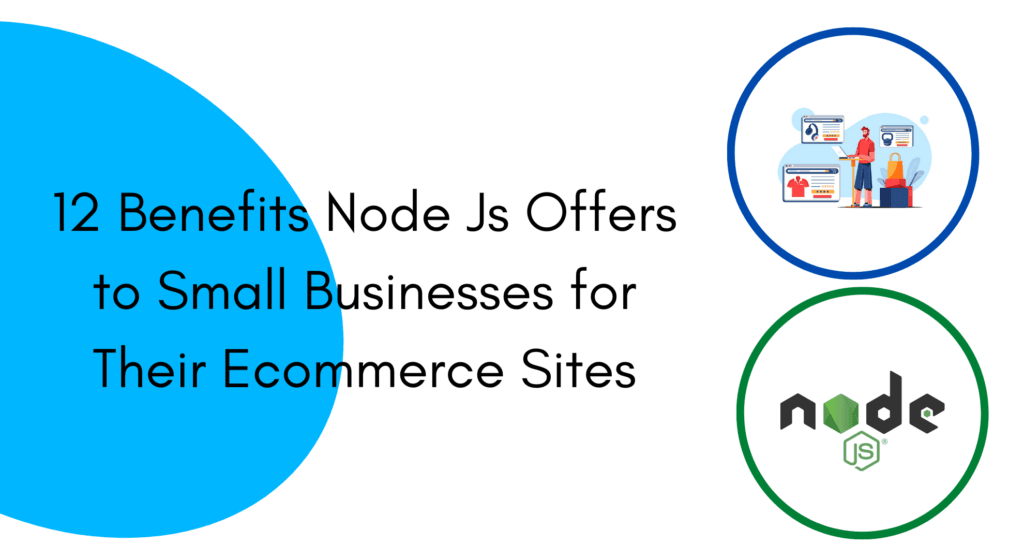Why Node.js is the Top Choice for Backend Development in 2025

Many entrepreneurs often wonder why Node.js is the right choice for backend development. The future of applications built with Node.js looks highly promising, as the technology offers exceptional scalability, reliability, and security.
Node.js is powerful and helps developers develop real-time backend systems using Javascript. If you want to migrate the tech stacks or select the best technology for your app, you should consider Node.js at any time. Node.js remains a strong and versatile option.
Node.js is one of the world’s most prominent platforms, and it is trusted even by Netflix, Adobe, Spotify, and X.com. It’s literally a game changer in the industry and below-mentioned are the reasons why. In this blog, we will explore the reasons why Node.js stands out over other platforms and why you should prefer Node.js for app development in 2025.
Let’s find out if Node.js is worth its hype.
What Is Node.js?
Node.js is a popular programming language used for backend software development. It was written in C++ and built in Chrome’s V8 Javascript runtime.
Node.js is a server-side Javascript engine that helps to run backend applications on Linux, Windows, and OS X.
The technology was first introduced by Ryan Dahl in 2009 at the European JSConf. Soon after its release, it was recognized as the most exciting single piece of software in the Javascript Universe. It is an open-source platform that offers numerous benefits that we will explore in the next segment.
Node.js Market size:
Node.js is an extremely popular technology, powering over 6.3 billion websites worldwide. This accounts for approximately 2.1% of all websites using Node.js. According to the Stack Overflow Developer Survey, 40.8% of developers prefer Node.js for application development. These numbers indicate its strong preference in the developer community.
What is Node.js used for?
API creation:
Using Node.js robust library support system, you can develop RESTful API or GraphQL API easily.
Video Streaming Apps:
We all know how successful Netflix is as a video streaming app, don’t we? Well, it is built using Node.js as a platform. Node.js can process huge amounts of data sequentially. With Node.js, you do not have to initiate any temporary storage or caching in the program memory, which is the best thing about using Node.js for video streaming app development.
Gaming apps:
Node.js’s quick responsiveness is best suited for developing multiple-player games. It facilitates easy communication between one gamer and many other participants.
Real-time web applications:
Chat applications handle communications in real time. Again, to manage all these heavy loadings, Node.js is the best choice. One can use Node’s web sockets, and Events API to execute seamless communication.
Microservices:
You can use the Node.js lightweight feature to develop microservices.
Dashboard for Stock Traders:
Developing real-time applications for broker trading that facilitate calculations, price tracking, graph creation, and chart creation with ease using Node.js.
Industries That Are Benefitting from Node.js:

With millions of websites already live globally, here are a few industries that benefit from Node.js.
- Media and Entertainment Industry:
- Social networking;
- Healthcare;
- Banking;
- eCommerce;
- Shipping and Logistics;
- Real Estate;
Benefits of Using Node.js:
Node.js has earned its place for all the right reasons. Its robust features and capabilities make it an ideal choice for developing enterprise-level applications. It has crossed React.js popularity with 40% of developers using Node.js as compared to React.js. So, it’s no longer just a tool, but a platform on which developers rely greatly. Let’s find out why Node.js is the best pick for product development in 2025.

Faster and Scalable apps:
Applications built using Node.js are easily scalable both horizontally and vertically. You can perform horizontal partitioning and divide the application into small sets. With this, you can make your app visible in versions to users based on their interests, age, and location.
The multiple threads can run simultaneously and interact with each other. Node.js cluster module can manage the load balancing for CPU-specific tasks. You can add extra resources to single nodes during vertical scaling and run them together.
Also Read :- How to Improve Performance Scale of Your Custom Node.js Application
Ease of Learning:
Node.js is built on Javascript which is a very familiar language among front-end developers. The use of simple syntax and unified language makes it easier for developers to swiftly write code for Node.js.
High Performance:
Node.js leverages Google’s V8 JavaScript engine to execute JavaScript efficiently. It compiles Node.js code directly into machine code, enabling developers to write and implement server-side applications seamlessly.
Its runtime environment supports non-blocking I/O operations, ensuring smooth performance. The single-threaded event loop utilizes multiple worker threads in the background to handle asynchronous programming. As a result, callback functions are managed by the event loop while being executed by separate threads, optimizing performance and scalability.
Benefits of Fullstack JS:
With Node.js, you can create both, server-side and client-side Javascript applications. The ease of learning increases the app development speed drastically, without any need to hire any extra resources. This saves you money and time.
Support for Huge community:
Node.js has an active community of members who constantly contribute to improving the framework. They proactively participate and provide instant assistance for any programming issues.
You can check GitHub for instant help and solve the issue quickly. Amazon, Google, Facebook, and Netflix also strongly support the Node.js community and actively participate in platform development.
Caching advantage:
Node.js caches single modules upon receiving the first module request. This means the codes are not re-executed upon receiving the second request leading to faster responses.
Supports various commonly used tools:
Node.js developers can make use of various tools to test the source code of Node.js applications. Also, with the Node.js framework managing dependencies is easy because of the npm package manager.
Now, regarding tools, you can use Jasmin for unit testing, Grunt for automating tasks, and many other tools to perform many other tasks simultaneously.
To summarize the list of benefits simply,
With Node.js, you can achieve the following tasks effortlessly.
- Fast and Scalable app development
- Single language for Front-end and back-end development
- Huge ecosystem of tools;
- Best for developing real-time applications;
- Save money and time for app development;
- Develop cross-platform applications with ease;
- Perform debugging and testing effectively;
- Renders SEO benefits
Disadvantages of Using Node.js:
Without a doubt, Node.js will lead the way in 2025, but some downsides of using it need to be discussed.
Application Programming Interface is Unstable:
API instability is a major challenge faced by Node.js developers. The changes made at frequent intervals in the API, force developers to execute changes in respective accessible code bases to match with the latest version of Node.js API.
Doesn’t have a strong library support system:
Javascript doesn’t have a well-equipped library system. This means developers have to use support from common libraries for performing various tasks.
Reduced performance due to heavy lifting tasks:
Node.js cannot handle the heavy CPU-intensive tasks. It utilizes the entire CPU power to perform the CPU-driven job received in the event loop. This process impacts the responsiveness of the app.
By introducing the “worker threads” module in 2018, Node.js programmers can run several threads at once, but with certain limitations.
Which Top Companies Rely On Node.js?
Well, you might have heard all the popular names like Netflix, Spotify, etc. but here is an entire list of market giants using Node.js already.
- Twitter;
- Spotify;
- eBay;
- Reddit;
- LinkedIn;
- Godaddy;
- PayPal;
- Netflix;
- Uber;
- Apple;
- Amazon;
- Walmart;
- Groupon;
A few other big giants also use Node.js for their production and development.
- Heroku;
- Digital Ocean;
- IBM Bluemix;
- Red Hat Openshift;
- Google Cloud Platform;
- Amazon Web Services;
When You Shouldn’t Use Node.js?
Well, with all the benefits and features that Node.js provides for app development, it still might not be perfect for certain use cases mentioned below.
Heavy server-side computing apps:
As Node.js uses only a single CPU core, it can block requests from server-side computing. In such cases, the event-driven non-blocking I/O model becomes useless.
CRUD Apps:
One shouldn’t use this Node.js framework for simple CRUD apps. CRUD apps receive data directly from the server, which no more requires Node.js features.
Conclusion:
For businesses looking to gain a competitive edge, Node.js is an excellent choice. It provides the flexibility, speed, and scalability needed for success. Node.js development is cost-effective, efficiently manages large datasets, and offers key features that make it a top-ranking technology.
If you are looking for product development in 2025 and need a reliable software development partner, please get in touch with us. We have the required expertise to build products efficiently. Whether you want to optimize your backend or hire Node.js developer for your project, we are here to help!
 Healthcare
Healthcare  Education
Education  Real Estate
Real Estate  Logistic
Logistic  Themes
Themes
 Plugins
Plugins
 Patterns
Patterns





